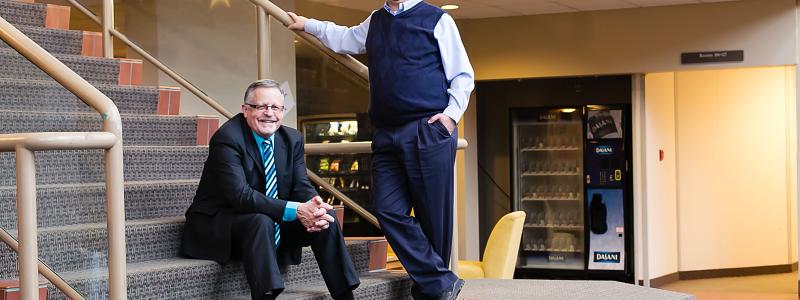Long-time TWU Director of Equity Access and Learning Resources David Stinson, M.Ed., and School of Business Professor Mark Lee, Ph.D., have been awarded the Outstanding Research Paper Award at the 2013 International Association of Business and Economics (IABE) Conference.
The paper, Sustaining Corporate Performance through Employee Well-Being: Applying the Stinson Wellness Model in a Business Environment, is based on the Stinson Personal Wellness Model, which Stinson researched and developed over the course of more than a decade.
When TWU’s Wellness Centre was established in the late 1990s, one key facet of its mandate was to develop clear messages around the concept of wellness, and make them available to students. Stinson thought it would be a good idea to create a survey—but found it challenging since, in the known or accepted surveys available at the time, there was little connection between the different wellness dimensions (emotions, intellect, body, spirit, social, and vocation). In 1999, Stinson’s concept began to take shape. “A light went on,” he said. “I settled on the four pillars and the idea evolved from there.”
Since then, the Model has been used across the TWU campus—from the Student Life Office to the School of Nursing—as a means to help students live well.
Stinson’s Personal Wellness Model identifies four pillars that provide a foundation of wellness: purpose, balance, congruence, and sustainability. These pillars can be applied to the different wellness dimensions and to the relationship between them. Together, they form a grid by which people can begin to assess their own level of wellness.
While, to date, the Model has been primarily used by TWU students, faculty, and staff, its principles can be applied far beyond the campus. Through a mutual friend—who felt Stinson’s research had applications for the business community—Stinson and Business Professor Mark Lee connected and began work on their paper for the IABE. Initially, the goal was simply to get their piece published. But to their surprise, the paper garnered the Outstanding Research Paper Award.
“It’s an honour to have Dave’s wellness model recognized by an international body for being a brilliant piece of original thought,” said Lee, who has extensive experience in business as well as academia. “It raises the profile of the University on an international level and helps raise the perceived level of scholarship that is being produced by the professors at TWU.”
The pair will begin work on two follow-up journal articles: the first will compare and contrast decision-making models currently used in business with the Stinson Wellness Model, and the second will use the Model to facilitate a dialogue on how to integrate faith and beliefs into the strategic decision-making process at the corporate or organizational level.
“What appeals to me about the Stinson Wellness Model is that it takes a broad range of factors into account when making decisions,” Lee said. “The basic premise is that wise decision-making is the core of wellness at a personal level—and I would suggest wise-decision making is at the core of sustainable corporate and organizational wellness.”
For his part, Stinson is honoured and humbled to receive recognition for the years of research he has invested in student wellness. “When students are in crisis it is often a purpose or balance issue,” he said. “The student may wonder why they are doing their degree, or may have let their school work go and can’t catch up. One of the best things we can do is to help them look for their strengths and passions to find a direction that really fits for them. Then they have much greater success.”
Stinson recently published the book Aligning Life: the Stinson Wellness Model, which is available at the TWU Bookstore and on amazon.ca.
“Ultimately, we all go though tough times where we get discouraged and are overworked,” Stinson said. “The key is to be self-aware enough to be able to make corrections before a crisis evolves—and to intentionally balance the drain of life with those things that fill us up.”

